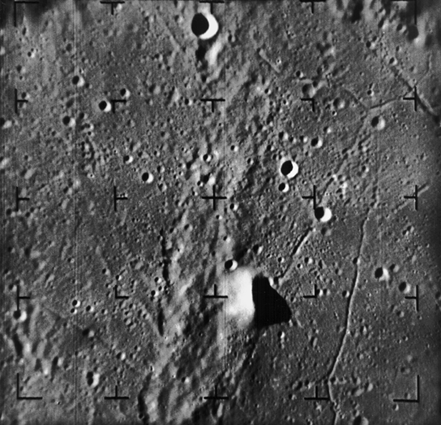Difference between revisions of "March 24, 2004"
| Line 1: | Line 1: | ||
__NOTOC__ | __NOTOC__ | ||
=RA9= | =RA9= | ||
| + | <!-- Start of content --> | ||
<table width="640" border="0" align="center" cellpadding="6" cellspacing="2"> | <table width="640" border="0" align="center" cellpadding="6" cellspacing="2"> | ||
<tr> | <tr> | ||
| Line 55: | Line 56: | ||
</table> | </table> | ||
<p> </p> | <p> </p> | ||
| + | <!-- End of content --> | ||
{{wiki/ArticleFooter}} | {{wiki/ArticleFooter}} | ||
Latest revision as of 19:14, 7 February 2015
RA9
|
RA9 Thirty-nine years ago today the Ranger 9 spacecraft crashed into the north-east floor of Alphonsus crater, having successfully taken 5,814 pictures during the previous 19 minutes. Rangers 7 and 8 had provided high resolution views of possible landing sites on mare surfaces, freeing Ranger 9 to explore a geologically more interesting site. Alphonsus was a highly interesting target because its dark halo craters and rilles showed that volcanism had occurred there in the past. More controversial was the observation by the Russian scientist Nikolai Kozyrev who believed that he had spectroscopically detected carbon (C2) gas escaping from the central peak of Alphonsus. Maybe the Moon was still volcanically active! Ranger 9 provided no answers to the question of continuing volcanism, but the 10 degree sun angle resulted in dramatic images. The central peak (now known not to be volcanic, but anorthosite, like the lunar highlands crust), dark halo craters (real ash volcanoes) and rilles are well shown, as is the ridge made of ejecta from the Imbrium basin impact. This was the first mission where pictures from space were shown live on TV. Related Links: Yesterday's LPOD: Magnificent Moon! Tomorrow's LPOD: Russian Gores |
|
Author & Editor: |
COMMENTS?
Register, Log in, and join in the comments.




